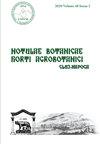氧化锌纳米颗粒改善葡萄中的生物活性化合物、酶活性和锌浓度
IF 1.3
4区 生物学
Q3 PLANT SCIENCES
引用次数: 0
摘要
土壤中的微量营养元素含量低,导致农作物缺乏这些微量营养元素,造成人口营养不良。全球约有 30 亿人因锌摄入不足而出现健康问题。农艺生物强化是生产富含微量营养元素的作物和缓解营养不良问题的一种方法。使用氧化锌纳米颗粒(NPs-ZnO)进行纳米生物强化是减轻和增加植物可食部分营养成分的良好策略。本研究旨在确定叶面喷洒氧化锌对产量、酶和非酶抗氧化化合物的生物合成及其生物累积的影响。本研究评估了叶面喷施氧化萘(NPs-ZnO):0、25、50、75 和 100 mg L-1 对葡萄果实产量、生物活性化合物含量及其生物累积的影响。处理的分布采用完全随机设计,每个处理由 10 株植物组成,每株植物代表一个实验单元。处理分别在果实形成期、成熟期和采收前 15 天进行叶面喷洒。叶面喷洒 NPs-ZnO 对产量、生物活性化合物的含量及其生物累积有积极影响。50-75 mg L-1 的氧化锰氮氧化物剂量提高了作物产量和酿酒参数。此外,所有评估剂量都改变了酶和非酶抗氧化剂,提高了葡萄浆果中的锌浓度。叶面喷洒氧化锰锌是提高葡萄质量和产量的一种替代方法,此外还能丰富其营养和抗氧化剂含量。本文章由计算机程序翻译,如有差异,请以英文原文为准。
ZnO nanoparticles improve bioactive compounds, enzymatic activity and zinc concentration in grapevine
The low availability of micronutrients in the soil leads to a deficit of these micronutrients in crops, causing malnutrition in the population. Approximately 3,000 million people in the world have health problems caused by inadequate Zn intake. Agronomic biofortification is a way to produce crops rich in micronutrients and mitigate malnutrition problems. Nano biofortification with zinc oxide nanoparticles (NPs-ZnO) is a good strategy to mitigate and increase the nutritional content of the edible part of the plant. The aim was to determine the effect of foliar spraying with NPs-ZnO on yield and biosynthesis of enzymatic and non-enzymatic antioxidant compounds and their bioaccumulation. In this study, the effect of foliar fertilization with NPs-ZnO: 0, 25, 50, 75, and 100 mg L-1, on yield, the content of bioactive compounds and their bioaccumulation in grapevine berries was evaluated. The distribution of the treatments was under a completely randomized design, each treatment consisted of 10 plants, each representing one experimental unit. The treatments were applied by foliar sprays at fruit formation, in veraison and 15 days before harvest. Foliar spraying with NPs-ZnO positively modifies yield, the content of bioactive compounds, and their bioaccumulation. Doses of 50-75 mg L-1 of NPs-ZnO increased crop yield, and oenological parameters. In addition, all doses evaluated modified enzymatic and non-enzymatic antioxidants, and improving Zn concentration in grapevine berries. Foliar spraying of NPs-ZnO is an alternative to improve grape quality and yield, in addition to enriching its nutritional and antioxidant content.
求助全文
通过发布文献求助,成功后即可免费获取论文全文。
去求助
来源期刊

Notulae Botanicae Horti Agrobotanici Cluj-napoca
PLANT SCIENCES-
CiteScore
2.70
自引率
0.00%
发文量
118
审稿时长
3 months
期刊介绍:
Notulae Botanicae Horti Agrobotanici Cluj-Napoca is a peer-reviewed biannual journal aimed at disseminating significant research and original papers, critical reviews and short reviews. The subjects refer on plant biodiversity, genetics and plant breeding, development of new methodologies that can be of interest to a wide audience of plant scientists in all areas of plant biology, agriculture, horticulture and forestry. The journal encourages authors to frame their research questions and discuss their results in terms of the major questions of plant sciences, thereby maximizing the impact and value of their research, and thus in favor of spreading their studies outcome. The papers must be of potential interest to a significant number of scientists and, if specific to a local situation, must be relevant to a wide body of knowledge in life sciences. Articles should make a significant contribution to the advancement of knowledge or toward a better understanding of existing biological and agricultural concepts. An international Editorial Board advises the journal. The total content of the journal may be used for educational, non-profit purposes without regard to copyright. The distribution of the material is encouraged with the condition that the authors and the source (Notulae Botanicae Horti Agrobotanici Cluj-Napoca or JCR abbrev. title Not Bot Horti Agrobo) are mentioned.
 求助内容:
求助内容: 应助结果提醒方式:
应助结果提醒方式:


